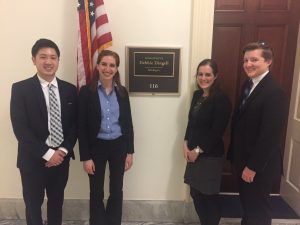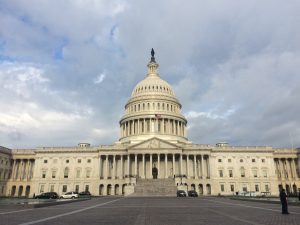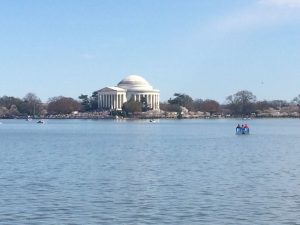April 24, 2017
An experiment I’m willing to try: Reflections on the CASE workshop
Posted by Timia Crisp
Editor’s note: The following post is written by Rachel Kirpes, a graduate student at University of Michigan and the 2017 AGU-sponsored CASE workshop participant.

Me (second from left) and other students from University Michigan preparing for our meeting in Rep. Dingell’s office. Rep. Dingell’s district includes Ann Arbor and the University of Michigan. (Photo Credit: Madeline Nykaza)
Earlier this month I had the wonderful opportunity to travel to Washington, D.C. for a three-day science policy workshop organized by AAAS – Catalyzing Advocacy for Science and Engineering (CASE). I arrived in D.C. early enough the first day to do some sightseeing before the workshop, so I was thoroughly inspired and ready to advocate for science!
About 100 students, all studying science or engineering, were either sponsored by their institution or, like me, sponsored by a professional society (thanks AGU!). The workshop is designed to be an entry-level experience for students (like me!) who are interested in learning about the role of science in policy-making and how to become advocates for basic research in their careers. We had speakers on a variety of topics from all branches of government and areas of policy.
One important lesson we learned right away is that science and policy have very different cultures, which we must understand in order to communicate and navigate between them. While science is driven by evidence, policy is value-oriented. Evidence-based policy doesn’t necessarily mean there is a “right” or “wrong” policy. As scientists, we must also be aware of when we are talking about knowledge gained by studying our area of expertise versus when we are discussing our opinions that were formed as a result of our expertise and experiences.
During the workshop, we also got a crash course in how Congress works and its motivations, specifically policy, politics, and procedure. It’s not as simple as Schoolhouse Rock would lead us to believe. As a scientist who is trained to be concise, think logically, and find creative solutions, the legislative process seems very frustrating. I had to remind myself again that we were diving into a very different culture, and it was critical to understand this process before discussing the federal budget and scientific research within the budget.
We were on Capitol Hill during appropriations season, so this topic was at the forefront of everyone’s minds. The budget, we learned, like all policy, is value driven. Currently, almost two thirds of the federal budget is dedicated to mandatory spending (i.e., Medicare, Medicaid, Social Security) a

We spent the second morning of the workshop at the Capitol learning about the federal budget process and hearing from congressional staff in preparation to meet with our legislators the next day. We arrived early enough in the morning to get some great pictures before it got busy!
nd the rest is divided into defense discretionary and non-defense discretionary, which includes most federal research funding. Currently, mandatory spending continues to increase, and there have been proposals to increase defense spending, which could result in cuts to non-defense discretionary spending. Reduced research funding will have drastic effects for the future of science. As part of the workshop, we were tasked with convincing our legislators that cuts for research will, in the long run, be a bad idea for our nation.
So, how do we become convincing advocates? Luckily, the workshop covered effective communication strategies and prepared us to meet with our members of Congress. We heard from Rep. Bill Foster, one of the 1.5 physicists in Congress, about how scientists can end up as policymakers themselves. We also had staffers from several Congressional offices and committees give us advice on how to advocate more effectively. They suggested we, as scientists, use our local ties to our policymakers’ districts as a starting point, and make sure we emphasize why our work matters, not necessarily what we do or how we do it. Knowing what committees a member of Congress serves on also helps to understand their priorities and can help us connect our research to their values. And finally, we were advised to be clear about what we are asking for (sustainable funding for science!) and always follow up.
Once we finally had all the tools we needed to communicate our science and advocate for funding scientific research, our next step was to meet with our members of Congress! On the last day of the workshop, I coordinated with other students from the University of Michigan (UM—my institution) and Michigan State University to schedule meetings in the offices of Senators and Representatives of our state/districts. We also worked to schedule meetings with offices who had ties to UM (Go Blue!). In total, we ended up with a busy day filled with meetings in six different offices! We discussed our message as a group beforehand so we could communicate a story that was miniature, memorable, and meaningful. It took a little practice to avoid jargon!
Overall, it was a very positive experience to meet with staffers in each office, share a little about our research its importance, and get their feedback on the current state of science funding, including the the FY17 and FY18 appropriations bills. It was also a nice opportunity to thank our Senators and Representatives who have been supportive of science and remind them of the importance of research occurring in their district. Finally, we followed up with staff via email after the workshop and gave shout-outs to our members of Congress on social media (it never hurts to tweet at your legislator!)
So, what can we do moving forward? One day of meetings was great, but it will take continued engagement to ensure support for science funding moving forward. Most of the students attending the CASE workshop, myself included, expressed interest in pursuing a policy-related career, realizing there is a role for scientists outside of academia. But all scientists, regardless of our current roles, can (and should!) be able to communicate our research to the public and to policymakers, to advocate for science. The role of scientists in the political sphere continues to be debated in the current climate, with the March for Science approaching, and was debated during the CASE workshop as well. Do we need to address the perception that scientists are elitist, condescending, stuck in our ivory towers? Is our credibility as experts dependent on scientists being viewed as apolitical? This is a decision each of us must make, but, after this workshop, I now have the tools and motivation to move forward as a scientist and as an advocate for science. Should scientists engage in politics? Rep. Bill Foster gave us some great advice during the CASE workshop: “It’s an experiment we have to try.”
For more information about the CASE workshop, please visit the AGU website.


